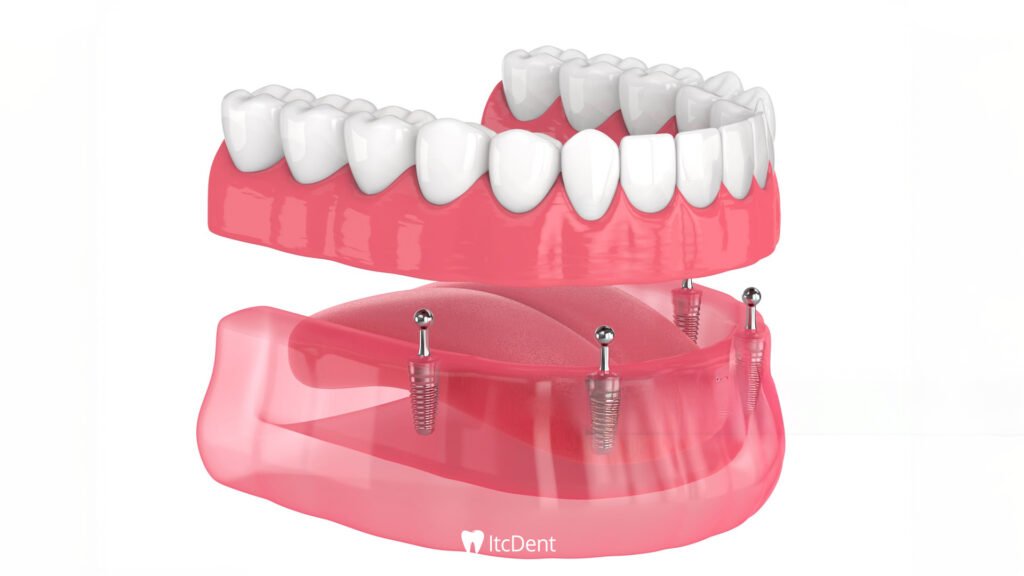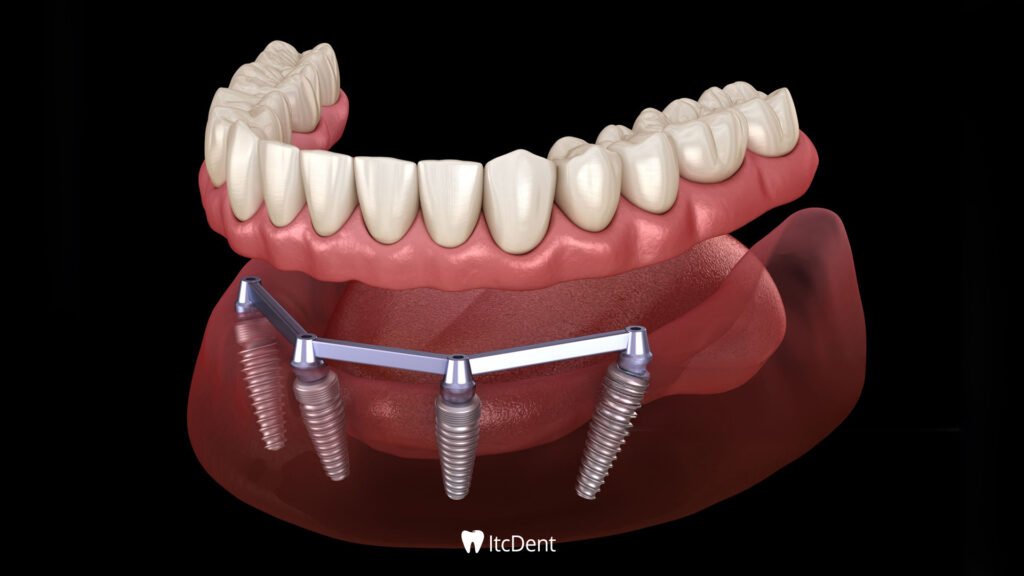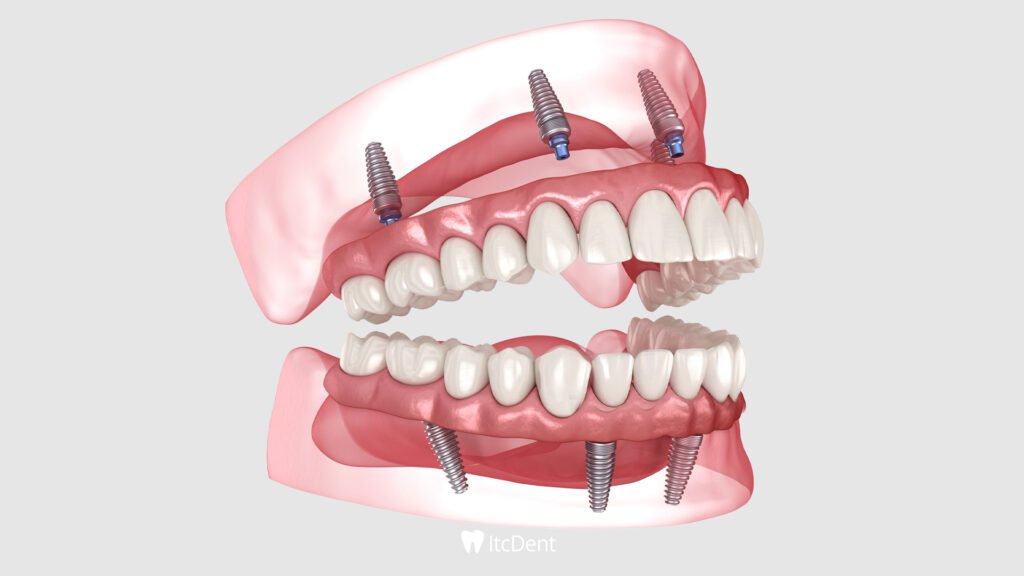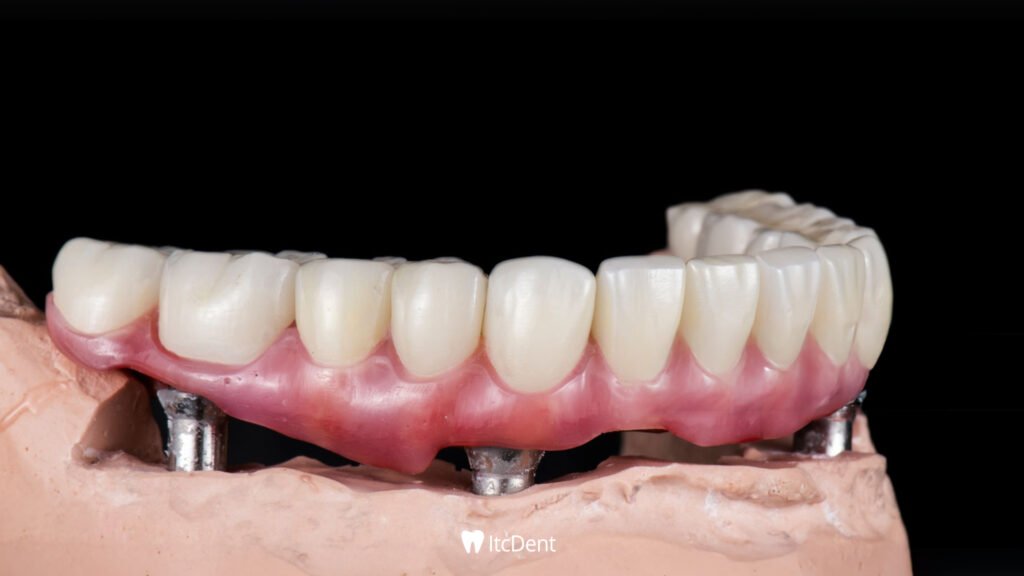Implant Supported Prosthesis
Tooth loss is a significant condition that affects not only oral health but also many aspects of daily life. Missing teeth make chewing difficult, cause us to avoid certain foods, and can even lead to digestive problems over time. Furthermore, the inability to pronounce words correctly or the shyness of smiling negatively impacts social life. Many people may even lose their self-confidence due to the aesthetic concerns caused by missing teeth.
Fortunately, modern dentistry has developed highly successful solutions, both aesthetically and functionally, to address these issues. One such solution is implant-supported dentures. Considered one of the closest alternatives to natural teeth, implant-supported dentures provide a durable and long-lasting replacement for lost teeth.
What is an Implant-Supported Denture?
Implant-supported dentures, as the name suggests, are removable prosthetic teeth that are fixed to dental implants placed in the jawbone. The cornerstone of this process is a special screw, usually made of titanium, that is inserted into the jawbone. These screws function like a natural tooth root, ensuring a secure hold for the prosthesis.
Once the implant placement process is complete and the implant has osseointegrated with the jawbone, the next step is to create a custom-made denture. These dentures are designed to perfectly resemble natural teeth in color, shape, and size. This ensures a flawless aesthetic appearance and restores basic functions such as chewing and speaking to a level similar to natural teeth.

The best part is the versatility of implant-supported dentures. This method is suitable not only for single tooth loss but also for those who have lost multiple teeth or are completely edentulous. So, whether you’re missing one front tooth or all your teeth, implant-supported dentures allow you to smile freely again and enjoy the foods you desire with peace of mind.
Types of Implant-Supported Dentures
Implant-supported dentures are basically divided into two groups based on their usage and fixation methods. The first of these is fixed implant-supported dentures.
-Fixed Implant-Supported Dentures
As the name suggests, these dentures are firmly secured to the implants with screws or special dental adhesives. Once placed, they cannot be removed by the patient; only the dentist can remove and maintain them as needed. Their appearance is virtually indistinguishable from natural teeth, and they feel equally natural in use.
This method is generally preferred by people with high aesthetic expectations who want a durable and long-lasting solution. Therefore, it is a suitable option for those who say, “I don’t want to deal with my teeth again; I want a permanent solution.”
Advantages:
- They feel like natural teeth, making speaking and chewing extremely comfortable.
- They don’t move or have a risk of dislodging.
- They are long-lasting; with proper care, they can be used for years without any problems.
Disadvantages:
- Cleaning and maintenance must be performed under the supervision of a dentist.
- They are more expensive than removable dentures.

Removable (Removable) Implant-Supported Dentures
Removable implant-supported dentures are removable dentures, thanks to special attachment systems built into the implants. The patient can easily remove the denture at any time, clean it, and reinsert it. They provide a much more secure hold than traditional dentures, especially in completely edentulous jaws.
These dentures offer a practical solution for both daily use and cleaning. They are a highly suitable option for those who want to maintain their teeth but still be able to easily remove and clean them when necessary.
Advantages:
- Cleaning and maintenance are very easy and can be done by the patient at home.
- They are much more stable and secure than traditional dentures.
- They are generally more affordable than fixed dentures.
Disadvantages:
- They do not provide as natural a feel as fixed dentures.
- They must be removed and replaced regularly, which may require some adjustment for some users.
How to Make an Implant-Supported Denture
The implant-supported denture process is a meticulous treatment method, individually planned and completed in several stages. First, the dentist performs a detailed oral examination and assesses the suitability of the jawbone for implants using imaging methods such as panoramic X-rays or 3D CT scans. A personalized treatment plan is developed, taking into account factors such as the number of missing teeth, bone density, gum health, and oral hygiene. Then, titanium implants are surgically placed in the jawbone under local anesthesia.
This procedure is generally painless and requires a two to four-month wait for the implant to fuse with the jawbone, or osseointegration, to complete. Once the implants have fully integrated with the bone, your dentist takes impressions of your mouth, and based on these measurements, custom dentures that resemble natural teeth are fabricated in the laboratory.
In the final stage, the prepared dentures are fixed to the implants or mounted removable, and the dentist then completes the process by making the necessary fine-tuning adjustments to ensure your bite and chewing comfort. This results in a result as close to natural teeth as possible in terms of both aesthetics and function.

Advantages of Implant-Supported Dentures
One of the greatest advantages of implant-supported dentures is their exceptionally close resemblance to natural teeth; their color, shape, and shine are virtually indistinguishable from real teeth. Furthermore, because they are securely fastened, they won’t move or fall during use, and they don’t cause any problems while eating, providing great comfort for the user. With proper care, they can last for 15-20 years or even longer. Furthermore, because implants stimulate the jawbone like a natural tooth root, they help prevent osteoporosis. Thanks to their fixed structure, the denture doesn’t slip during speech, allowing for clear and comfortable pronunciation.
Denture Prices
Denture prices can vary significantly, beyond a single figure. This is primarily due to the quality of the materials used, the type of denture (fixed, removable, implant-supported, etc.), the treatment method to be used, and any additional procedures required based on the patient’s oral structure.
For example, a partial denture, replacing just a few teeth, differs in both the process and the materials used. Furthermore, the denture’s laboratory production process, the dentist’s experience, the technology used, and even the clinic’s location can all affect the price.
Therefore, if you’re considering dentures, you can obtain the most accurate and personalized pricing information after a consultation. Your dentist will determine the best solution for your needs and expectations, providing you with a clear treatment plan and cost estimates.


